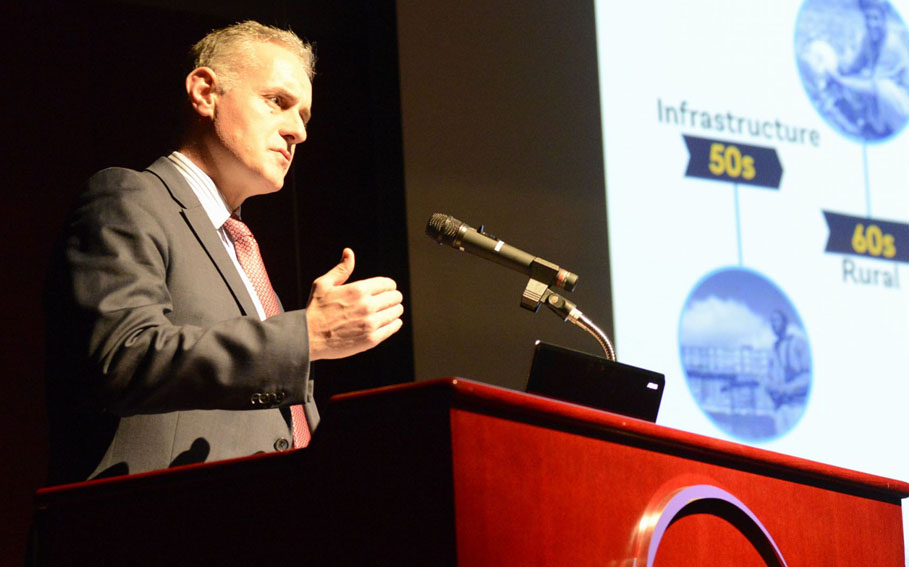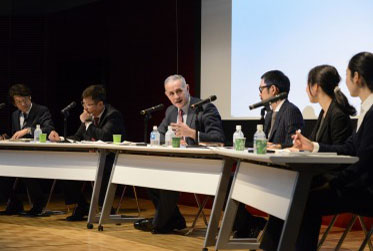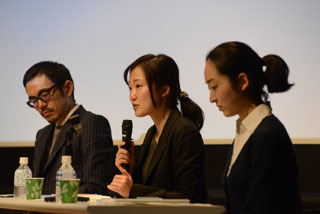News Archives
2016.3.8
“GRIPS/World Bank Career Seminar: Human Resources and Global Society” jointly held by the World Bank and GRIPS
The National Graduate Institute for Policy Studies (GRIPS) convened this career seminar for the purpose of developing professionals possessing both advanced skills and broad perspectives, thus enabling them to succeed in the international arena. GRIPS conducts over 80 percent of lectures and research guidance in English, and offers a diverse degree program intended to educate international professionals. For many of the students who come here from 66 countries and regions around the world to study, international bodies like the World Bank and the United Nations, in addition to administrative and research institutions in their home countries, are some of their major career options.
On Tuesday, March 8, a career seminar entitled “GRIPS/World Bank Career Seminar: Human Resources and Global Society” was jointly held by the World Bank and GRIPS. Soukairou Hall, located on the GRIPS campus, served as the venue.
The World Bank and GRIPS collaborate on many fronts that extend beyond organizing such joint seminars. Since its creation, the graduate school’s Public Finance Program has been run with the support of the World Bank and the Japanese government in order to educate young people who in the future will become administrative officials holding responsibilities in the realm of tax policy, the idea being that they will provide their knowledge to assist with the tax policies of developing countries. In addition, joint research on industrial development in Ethiopia, Vietnam and Tanzania has also been carried out.
At the seminar, guests Vice President of World Bank Group Human Resources Sean McGrath, World Bank Group Human Resources Client Services Director Wei Wang, Special Representative to Japan Yasusuke Tsukagoshi and Executive Director for Japan Kan were welcomed. A presentation was given on the World Bank’s mission and hiring policies, while the second half of the seminar featured a panel discussion joined by GRIPS Assistant Professor Yusuke Takagi, along with Ph.D. students Yoko Oishi and Tomomi Tanaka as panelists. Questions were taken from the audience, while there was also a Q&A and exchange of opinions on the World Bank’s hiring policies and its personnel. At the seminar’s opening, Special Representative to Japan Tsukagoshi greeted the audience by saying, “I hope that as many of the people assembled here today in this hall as possible will one day work to stamp out poverty in developing countries and share prosperity with them.” GRIPS President Takashi Shiraishi followed to point out that there are few Japanese people working at international institutions and explain how GRIPS educates the international professionals of the future. He also stated his hope that participants in the day’s seminar would learn about what it takes to become an international professional. President Shiraishi then went on to introduce and thank the World Bank as an institution that collaborates with GRIPS. Representative director Kan presented on the partnership between the World Bank and Japan and expressed his desire for the seminar to stimulate interest in the work of the World Bank and provide an opportunity for attendees to consider the World Bank as a future career option.
Many of the people who gathered at the venue were students aspiring to work at an international institution. The competition for jobs at the World Bank is incredibly fierce, as it receives inquiries from between 50,000 and 60,000 applicants a year. Vice President Sean McGrath explained how the World Bank has produced results in its work to find solutions for such matters as global development, which is an issue that is ever-changing due to factors like urbanization, aging populations and population migrations caused by conflict. He went on to introduce the four qualities the World Bank is looking for in its employees. He emphasized that the World Bank wants people who can adapt to the diversification and growing complexity of clients and international issues, have a wealth of highly specialized skills, and who are passionate about what they do.
In the meantime, the World Bank is devoting effort to hiring people from Japan—which is poorly represented among the staff working at the World Bank—based on the idea that a diversity of nationalities and skills among the World Bank’s staff will help solve clients’ problems. During the Q&A session, there was a question about why there was a need for a mission to recruit Japanese people. According to Mr. McGrath, the World Bank wants the unique capabilities that only the Japanese have. For example, Japan’s experience with disaster management, finance and banking cannot be found in people from any country other than Japan, and the World Bank wants to combine proficiencies founded on such experience with techniques emanating from other countries.
As Mr. McGrath and Assistant Professor Takagi mentioned during the seminar, the role played by low-interest financing from the World Bank between 1953 and 1966 cannot be ignored when considering Japan’s post-war era of rapid economic growth. Japan repaid its loans in 1990, and now is the second-largest creditor after the United States. However, the next role the world needs Japan to carry out is for its people to help stamp out global poverty by working through international institutions and other bodies to utilize the unique talent of their country.
One of the GRIPS students attending the seminar expressed a very detailed understanding of the ideal people the World Bank is looking for and its hiring schedule. The student said it had become clear what kinds of skills need to be learned to join the World Bank and indicated a desire to develop such abilities. Meanwhile, Mr. McGrath said that while the people working in the international arena are ones with whom partners and clients want to work with, he emphasized that academic credentials and capabilities are equally important. In addition to academic credentials and techniques, Japanese and international students at GRIPS can also gain the opportunity to develop into international professionals at GRIPS, where the diverse student body improves themselves by learning from each other in their interactions.
Article by Public Relations Division








